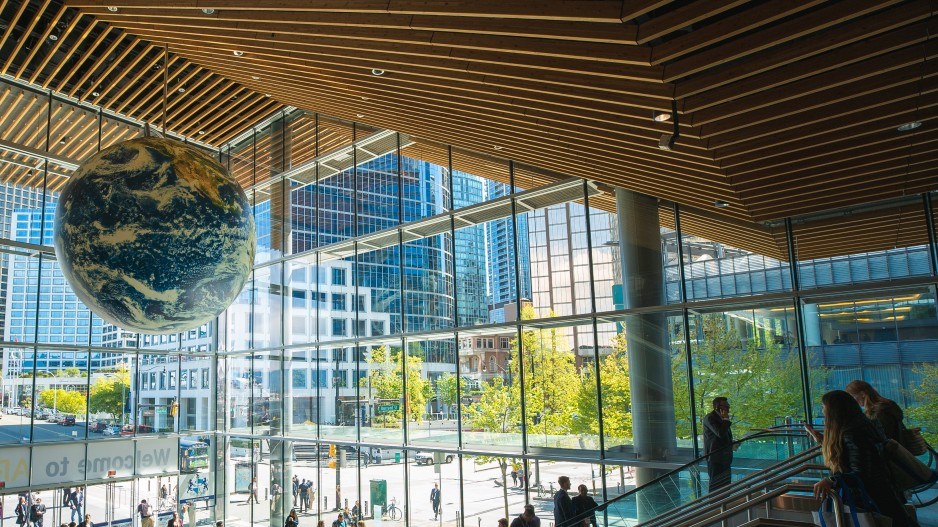Vancouver is known for having a host of unique meeting places, and the city of itself continues to see demand from out-of-town companies looking to travel to the city for events.
However, inflation, high travel costs and a shortage of hotel rooms in the city is squeezing not only the companies who look to bring their employees to Vancouver, but also the convention centres and organizations who put on and accommodate the events.
Sooner or later, these cost pressures will impact attendance, said Dave Gazley, vice-president of meeting and convention sales and service with Destination Vancouver.
Despite these challenges, industry experts say they are cautiously optimistic that companies will continue to come from other cities or provinces thanks to strategic planning, a number of hotel projects in the pipeline and multiple events lined up for 2024.
“The reality is Vancouver is a tier-one city and the pricing of our hotel product is not inexpensive. We have fantastic hotels in Vancouver, we have a great value proposition, but we are sometimes seen as an expensive city,” Gazley said.
Appetite for corporate events and association meetings with 1,000 or more attendees who live more than 80 kilometres away, also known as city-wides, has returned following the height of the pandemic, according to Claire Smith, vice-president of sales and marketing at the Vancouver Convention Centre (VCC).
Typically, the VCC will have four city-wide events a year. However, in 2023 the LEED-Platinum-certified convention centre hosted eight, Smith said.
“Companies have changed since the pandemic, a lot of their employees are still working remotely,” she said. “They really realize the convention is a way to instil corporate culture, corporate knowledge, launch new products and educate their sales force. The importance of a corporate meeting has been really reinforced.”
The number of smaller scale events – those with under 1,000 attendees – that also draw company executives and employees from out of town have been on par with pre-COVID-19 levels, according to Joanne Burns Millar, CEO of Pacific Destination Services Inc.
Her company works with corporate groups and Fortune 500 companies that bring their top achievers and teams to B.C. and Alberta for performance reward and development, corporate culture enrichment and knowledge sharing. These companies primarily come from U.S., but also Australia, the U.K. and Europe.
“2022 hit us like a ton of bricks,” Burns Millar said. “My company had our best revenue and profit year in 25 years in an eight-month span, because our year didn’t start until March. So, fast and furious recovery is what I would say, and the outlook is looking conservatively positive given the world events.”
The No. 1 issue that threatens this recovery is the shortage of hotel rooms in Vancouver, according to all three experts who spoke to BIV.
Over the past 15 years, Gazley predicts that the city has lost roughly 1,500 hotel rooms.
Being able to balance Vancouver’s status as a high value, sought-after destination with becoming increasingly unaffordable is a priority, said Burns Millar, who also sits on the board of Destination Vancouver.
One potential hotel project in the pipeline is a 33-storey mixed-use hotel that was submitted for rezoning by Musson Cattell Mackey Architects on behalf of Deecorp Properties. It is located on the corner of Granville and Davie Streets.
Others include a 32-storey, 578-room hotel located on West Pender Street and Richards Street by developer Marcon, a 30-storey, 393-room hotel by Paul Y. Construction (B.C.) Ltd., Forme Development and Perkins and Will Architects and an approved hotel project by developer Amacon that will also include residential units at Cambie and Robson Streets.
While these projects move through the approval and construction pipeline, organizations such as Destination Vancouver and the VVCC are encouraging companies to visit Vancouver in the off-season.
Burns Millar said that many companies chose to plan events between the months of May and October. To offset this, Gazley said that Destination Vancouver actively encourages companies to visit Vancouver throughout all seasons of the year.
“It is very much an important role that we take to try and steer groups to come during the off-season. That will help their budgets, it’ll help their pricing or help their delegates ability to travel,” he said.
Not only does this take away some of the cost pressures associated with travel but it also ensures that Vancouver’s visitor economy is benefitting from the revenue these companies bring in the winter as well as the peak summer season.
Gazley said that over the next few years, Vancouver is “going to rock.”
Destination Vancouver has 27 city-wide events scheduled for 2024 with more in the works.
In addition, Vancouver will host a city-wide event in July 2025 for Alcoholics Anonymous that will bring together 50,000 to 60,000 people and is set to be the biggest convention Vancouver will have ever hosted.
“It’s going to be a really strong year. You look ahead to things like the Grey Cup, Invictus Games in 2025, obviously FIFA is on everybody’s radar, but there’s so much more happening under the radar that people don’t necessarily know about.”
Going forward, these events will have more of an emphasis on sustainability, community accountability and education, said Smith.
“What we’re seeing is people being very smart with what they’re spending and the decisions they’re making. So, they’re adding more components, the events are becoming more education rich and they’re trying to accomplish more in one event than they might have in the past,” she said, adding that employees piggyback meetings or leisure travel onto the event that brings them to Vancouver.
Employees are also encouraging companies to think about the environmental impact that travelling to an event may cause and strategies to mitigate this, Smith said.




